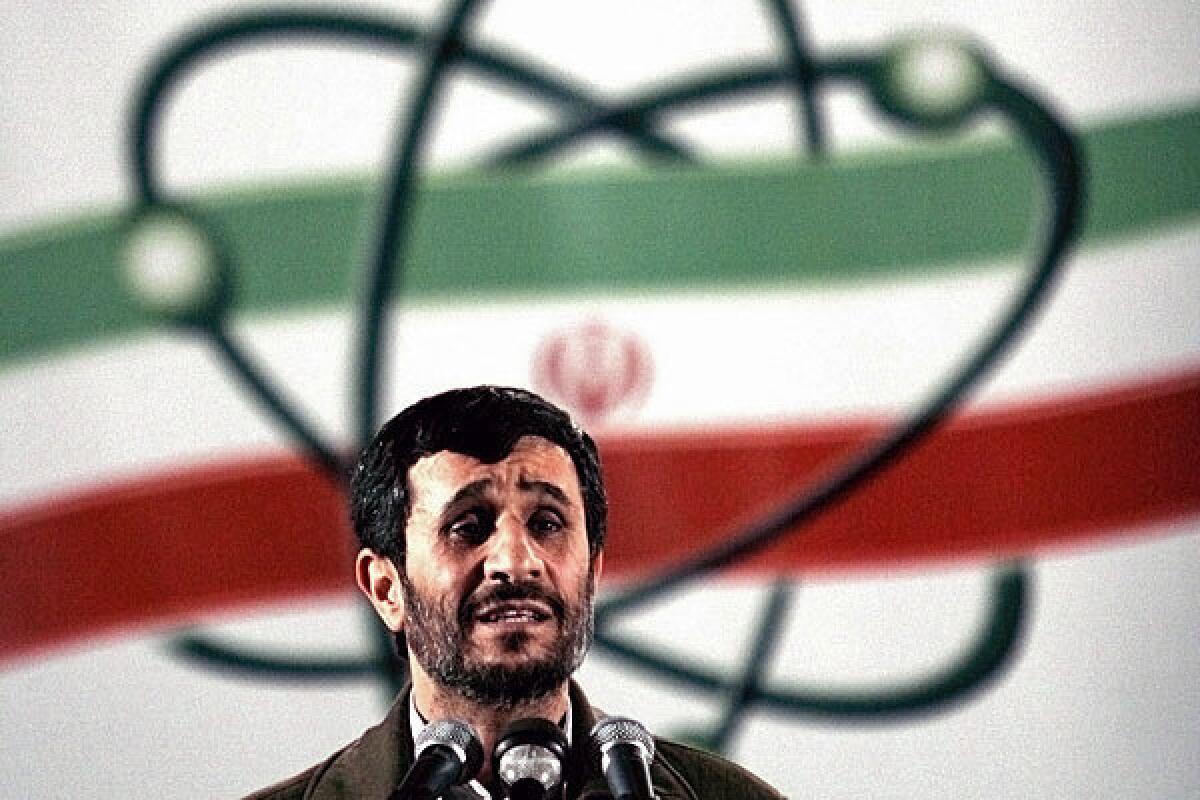Obama announces new sanctions on Iran

- Share via
WASHINGTON — President Obama announced new economic sanctions on Iran on Monday in a bid to raise pressure on conservative hard-liners who have vowed not to compromise with the West over Tehran’s nuclear development program.
Obama, who has faced demands from Congress to tighten sanctions, issued an executive order targeting large transactions involving the Iranian currency, the rial, in overseas banks. The goal is to further undermine a currency that has lost two-thirds of its value in two years.
He also slapped sanctions on Iran’s domestic auto industry, a major revenue source for the government and, U.S. experts charge, the cover for procuring industrial equipment that can be used for nuclear infrastructure.
The moves less than two weeks before Iran’s presidential election were the latest restrictions by the Obama administration amid an escalating standoff with Tehran over its nuclear program and its support for Syrian President Bashar Assad’s military campaign against rebels seeking to overthrow him.
U.S. experts said the new sanctions are unlikely to affect Iran’s June 14 election, which is being contested by eight conservative candidates who were approved by the nation’s hard-line theocracy.
Secretary of State John F. Kerry said last week that the outcome of the election won’t change Iran’s “fundamental calculus,” which is determined by the anti-Western supreme leader, Ayatollah Ali Khamenei.
“The discourse of the campaign in Iran has already been formulated along the lines of how hard-core you are going to be against Western sanctions,” said Mehrzad Boroujerdi, an Iran expert and associate professor at Syracuse University.
Obama administration officials say the latest sanctions are intended to narrow the choice for Iran’s ruling clerics: Abandon pursuit of a nuclear weapon or face economic collapse. Iran’s leaders deny they are seeking to build a nuclear bomb.
“This is a significant step up in the force and reach of our sanctions, but there is more to come,” said a senior Obama administration official who briefed reporters on condition of anonymity.
The new sanctions are to go into effect July 1, the same day as measures Obama previously announced to target Iran’s shipping and energy sectors.
There are no credible preelection polls, but the presumed front-runner is Saeed Jalili, Iran’s longtime nuclear negotiator and a close ally of Khamenei.
Jalili has drawn large crowds at rallies that feature anti-Western rhetoric and the slogan “No compromise,” but he has offered few serious proposals for pulling Iran out of economic troubles that have deepened because of U.S. and European sanctions.
No candidate is expected to win the required majority of votes, probably forcing a runoff between the top two vote-getters.
The outgoing president, Mahmoud Ahmadinejad, won reelection in 2009 in a campaign marred by a brutal crackdown against opposition supporters. The leading moderate candidate in this year’s race, Ali Akbar Hashemi Rafsanjani, a centrist former president, last month was banned from the contest by Iran’s supervisory electoral body.
The Obama administration has few options for trying to influence the outcome other than escalating economic pressure.
Last week, the Treasury Department issued a general license authorizing companies to sell low-end technology, such as home computers and wireless routers, to Iranian consumers to improve communications during the campaign, but the Iranian government maintains an iron-fisted grip on the country’s cellular and Internet networks.
Some current and former senior U.S. officials have begun to openly question the wisdom of increasing sanctions, arguing that they aren’t persuading Iran to stop enriching uranium.
“Had Rafsanjani run, the administration may have been more reticent in using sanctions,” said Mark Dubowitz, executive director of the Foundation for Defense of Democracies, an independent group that advocates tougher sanctions. “There is now a widely held assumption in the administration that there are only hard-liners running.”
The sanctions on trade in Iranian rials is intended to force foreign banks holding large amounts of the currency to dump it, “to make it as unusable a currency as possible,” a senior administration official said.
Iranian elites, including senior government and military officials, maintain access to large sums in rials and use foreign banks to change the currency into dollars, euros and other denominations.
The move against the Iranian auto industry targets a sector that is believed to account for about 10% of Iran’s economy, according to experts.
Dubowitz and others have argued that the auto industry, the Middle East’s largest, is controlled by members of the elite paramilitary Revolutionary Guard, which has used front companies overseas to acquire carbon fiber, hardened steel and other industrial equipment needed to make the centrifuges that enrich uranium for nuclear production.
More to Read
Sign up for Essential California
The most important California stories and recommendations in your inbox every morning.
You may occasionally receive promotional content from the Los Angeles Times.














